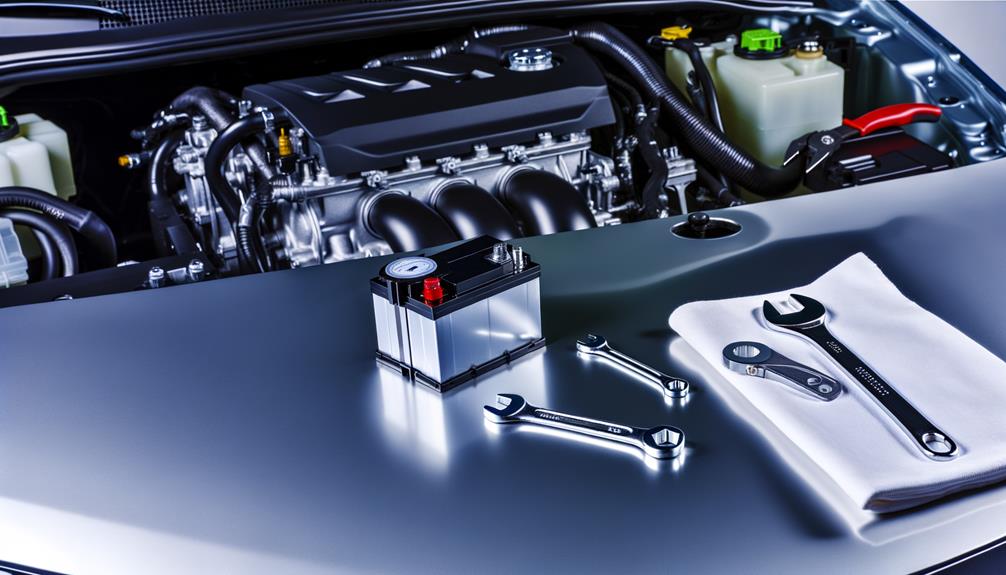When you're considering the lifespan of a hybrid car battery, there are several factors to think about. Typically, these batteries last between 100,000 to 200,000 miles, but your driving habits, climate, and maintenance routine can greatly influence this range. Manufacturers often provide warranties up to 8 years or 100,000 miles, but some states like California even require longer coverage. So, how do you make certain your battery endures for the long haul, possibly the entire life of your vehicle? Understanding the fine details can be essential.
Contents
Hybrid Battery Lifespan Basics
Understanding the lifespan of a hybrid car battery is vital for making informed decisions about maintenance and potential replacement costs. Typically, the hybrid battery lifespan ranges from 100,000 to 200,000 miles under ideal conditions. This range can give you a benchmark to evaluate the longevity of your investment in hybrid vehicles. It's significant to recognize that most hybrid batteries come with warranty coverage that usually lasts up to 8 years or 100,000 miles. Some states, like California, have stricter regulations, mandating longer warranty periods to offer additional peace of mind.
As your hybrid vehicle ages, the efficiency and power storage capabilities of its battery can degrade. This means you might experience reduced performance over time, which could eventually necessitate a battery replacement. However, proper care and maintenance can help extend the hybrid battery lifespan. Regular check-ups, adhering to the manufacturer's guidelines, and using the vehicle as recommended can potentially allow the battery to last the entire lifetime of the vehicle.
Moreover, advances in hybrid technology are continuously being made. Future models are expected to exhibit improved battery performance and longevity, thanks to ongoing research and development in this field. While current hybrid batteries are already quite durable, these advancements will likely offer even greater reliability and efficiency.
When considering a hybrid vehicle, it's essential to weigh the initial cost against the potential long-term savings and the warranty coverage provided. Understanding these aspects will help you make a well-informed decision and maximize the benefits of your hybrid vehicle.
Factors Influencing Battery Life
Numerous factors can greatly influence the lifespan of a hybrid car battery, ranging from driving habits to environmental conditions. Your driving habits play an essential role in how long your battery will last. Aggressive driving, characterized by rapid acceleration and heavy braking, places significant strain on the battery. Conversely, gentle driving habits—smooth acceleration and deceleration—can help extend the battery's lifespan. Additionally, the nature of your trips matters; frequent short trips prevent the battery from fully cycling, thereby reducing its overall health compared to longer, consistent drives.
Environmental temperature is another vital factor. Hybrid batteries operate efficiently within a specific temperature range. Extreme temperatures, whether hot or cold, can degrade battery performance and longevity. High temperatures can accelerate the chemical reactions within the battery, leading to premature aging. Cold temperatures, on the other hand, can reduce the battery's efficiency and increase internal resistance. You can mitigate these effects by parking in shaded areas during hot weather and using a garage in colder climates.
Maintenance is equally important for maximizing battery life. Regular maintenance checks and strict adherence to service intervals are paramount. During these checks, technicians can identify and address issues before they become significant problems, ensuring the battery remains in ideal condition. Neglecting maintenance can lead to unnoticed issues that degrade battery performance over time.
Toyota Hybrid Battery Longevity

When evaluating hybrid car battery longevity, Toyota's reputation for durability and efficiency stands out. Toyota hybrid batteries are engineered for extended use, often ranging between 80,000 to 100,000 miles, with some reports indicating lifespans of up to 200,000 miles under ideal conditions. This impressive longevity is a reflection of Toyota's advanced battery management systems, which meticulously regulate charge and discharge cycles to prevent excessive wear.
Here's a detailed look at why Toyota hybrid batteries last so long:
- Extended Warranty: For 2020 models and newer, Toyota offers an extended warranty that covers hybrid batteries for up to 10 years or 150,000 miles. This warranty provides peace of mind and underscores Toyota's confidence in the durability of its batteries.
- Minimal Degradation: Long-term tests, such as those conducted on the 2002 Prius, show minimal degradation even after reaching over 200,000 miles. These outcomes highlight the robustness of Toyota's battery technology.
- Efficient Battery Management Systems: Toyota's hybrid vehicles incorporate efficient battery management systems that prevent excessive charge and discharge, greatly enhancing battery longevity.
- Real-world Driving Conditions: Considering the average American drives approximately 10,000 miles per year, a well-maintained Toyota hybrid could potentially offer over a decade of reliable service with its original battery.
Symptoms of Battery Degradation
When you notice your hybrid car's fuel economy worsening, it can be a clear sign of battery degradation, indicating inefficiency in battery performance. Additionally, if the battery charge depletes rapidly, it suggests the battery can't hold a sufficient charge anymore. Monitoring these symptoms is essential for evaluating the health of your hybrid battery system.
Signs of Poor Economy
A decline in fuel economy is often one of the earliest indicators of battery degradation in a hybrid vehicle. Battery issues can lead to decreased efficiency in energy usage, directly impacting fuel economy. When your hybrid car's battery performance starts to falter, you'll notice that you're visiting the gas station more frequently. This decreased fuel economy is a telltale sign that the battery is not storing and supplying energy as effectively as it should.
Here are some specific symptoms to watch for:
- Reduced Acceleration: If your vehicle struggles to accelerate or feels sluggish, it could signify that the battery isn't providing adequate power.
- Frequent Engine Start-Stop Cycles: An aging battery may cause the internal combustion engine to kick in more often, reducing fuel efficiency.
- Erratic Electrical Behavior: Odd fluctuations in your vehicle's electrical systems, such as erratic gauge readings or warning lights, may indicate battery problems.
- Increased Fuel Consumption: Noticeably higher fuel consumption, despite similar driving habits, is a strong indicator of declining battery efficiency.
Rapid Charge Depletion
Experiencing rapid charge depletion is a clear indicator of hybrid car battery degradation. When your hybrid vehicle's battery begins to degrade, you might notice that it doesn't hold a charge as well as it used to, resulting in decreased overall vehicle performance. One of the first symptoms you'll likely observe is poor fuel economy. This occurs because the battery isn't efficiently supporting the hybrid system, making your engine work harder and consume more fuel.
Additionally, you might experience unusual electrical fluctuations. Erratic gauge behavior or dashboard warning lights can be early signs of potential battery failure. These fluctuations are a result of the battery's inability to maintain a stable charge, impacting the vehicle's overall electrical system.
Another symptom of battery degradation is clunky or sluggish driving performance. Insufficient battery power can make your hybrid vehicle feel less responsive, indicating that the battery requires a thorough assessment. Regular monitoring of your driving conditions and vehicle performance is essential; it helps identify early signs of battery degradation and allows for timely intervention. By keeping an eye on these symptoms, you can guarantee your hybrid vehicle continues to operate efficiently and effectively.
Maintenance Tips for Hybrid Batteries

To maximize the lifespan of your hybrid battery, prioritize regular service intervals, manage temperatures by parking in shaded areas or garages, and adopt gentle driving habits. These practices help prevent premature degradation and maintain peak performance. Additionally, monitoring battery health through check-ups can identify issues early, ensuring timely maintenance.
Regular Service Intervals
Maintaining regular service intervals is vital for the longevity and best performance of your hybrid car battery. Regular service intervals typically involve thorough battery health checks at every oil change or every 5,000 to 7,500 miles. By doing this, you guarantee that your battery is always operating at its peak performance level.
Here are some key maintenance tips for your hybrid car battery:
- Battery Health Checks: Schedule battery health checks consistently to monitor the state of charge and detect any early signs of degradation. These checks should align with your routine oil changes.
- Cooling System Inspections: Inspect the battery cooling system regularly, especially if you live in a hot climate. Overheating can greatly degrade battery life, so keeping the cooling system in top shape is essential.
- Tire Pressure and Alignment: Confirm proper tire pressure and vehicle alignment. These factors influence overall vehicle efficiency and, indirectly, the longevity of your battery.
- Manufacturer Guidelines: Adhere strictly to the manufacturer's maintenance guidelines. This helps in preventing premature aging and guarantees that the battery operates within its ideal parameters.
Temperature Management Practices
When it comes to hybrid car battery longevity, effective temperature management is necessary. Proper maintenance practices play an important role in guaranteeing your hybrid battery maintains its best performance. Start by parking in shaded areas during hot weather to prevent overheating. High temperatures can greatly degrade battery health, so keeping your vehicle cool is essential.
In colder climates, garaging your vehicle helps protect the battery from extreme low temperatures, which can reduce its performance and lifespan. Additionally, utilizing auxiliary cooling systems in hot environments is crucial. These systems make sure the battery remains within its ideal operating temperature range, reducing the risk of thermal damage.
Regular maintenance is indispensable for best temperature management. Make it a habit to check and clean the cooling fans; this assures proper airflow and efficient thermal regulation for your hybrid battery. Following manufacturer-recommended service intervals is also important. These intervals often include battery health assessments and adjustments necessary to enhance temperature management.
Gentle Driving Habits
Adopting gentle driving habits is essential for extending the lifespan of your hybrid car battery. By minimizing rapid acceleration and hard braking, you can greatly reduce strain and wear on your battery, thereby helping hybrid batteries last longer. Utilizing regenerative braking effectively during gentle driving not only recharges the battery but also contributes to its longevity.
Maintaining a steady speed rather than aggressive driving optimizes battery efficiency, prolonging its effective life. Studies show that hybrid batteries can achieve the upper end of their average lifespan, between 100,000 to 200,000 miles, when drivers engage in smoother driving patterns. Regularly monitoring and adjusting your driving habits can prevent unnecessary battery degradation and enhance overall vehicle performance.
Here are some practical tips to incorporate gentle driving habits:
- Avoid Rapid Acceleration: Gradual acceleration reduces stress on the battery.
- Use Regenerative Braking: Harness energy through regenerative braking to recharge the battery.
- Maintain Steady Speeds: Consistent speeds optimize battery efficiency and lifespan.
- Monitor and Adjust Driving Patterns: Regularly assess and refine your driving habits for maximum battery longevity.
Cost of Battery Replacement
Ever wondered how much it will set you back to replace a hybrid car battery? The cost of battery replacement for hybrid vehicles can vary widely, generally ranging from $1,000 to $6,000. This variation hinges on the make and model of your vehicle, with some models incurring markedly higher replacement costs. New lithium-ion hybrid batteries usually cost between $1,000 and $3,000, excluding labor charges for installation, which can add to your overall expenses.
For high-end models, replacement costs can skyrocket to as much as $6,000. This makes it essential for you to budget accordingly as your vehicle's battery approaches the end of its lifespan, typically around the 100,000-mile mark. Proper financial planning is vital to avoid any unexpected financial strain.
Alternatively, you might consider used batteries sourced from crashed vehicles as a more economical option. While these can be notably cheaper, they come with inherent risks regarding reliability and longevity. These second-hand batteries might not offer the same performance or lifespan as new ones, potentially leading to further costs down the line.
Being aware of the potential replacement costs for hybrid batteries can help you make informed decisions about your vehicle's maintenance and overall cost of ownership. Whether you opt for a new battery or a used one, understanding the financial implications can save you from unwelcome surprises. Ultimately, the replacement cost is a key factor that you should consider when owning and maintaining a hybrid vehicle.
Frequently Asked Questions
How Much Does It Cost to Replace a Hybrid Battery?
Battery replacement costs for a hybrid car can range from $1,000 to $6,000. Evaluate warranty coverage options and consider recycling hybrid batteries to manage expenses. Used batteries from salvage vehicles might offer a cost-effective alternative.
What Is the Life Expectancy of a Hybrid Car Battery?
You can expect a hybrid car battery to last between 100,000 to 200,000 miles. Battery maintenance tips and factors affecting longevity, like driving habits and hybrid battery technology, greatly impact the lifespan, potentially extending it beyond average estimates.
Can You Still Drive a Hybrid Without the Battery?
You can drive a hybrid without the battery, but it's not ideal. Reduced fuel efficiency and performance impairments occur. Consider battery maintenance tips, hybrid driving techniques, and battery warranty options to avoid long-term damage and voided warranties.
How Often Do Hybrid Batteries Need to Be Replaced?
You'll need to replace hybrid batteries every 100,000 to 200,000 miles. Regular battery maintenance tips and monitoring signs battery replacement, like decreased performance, can extend the hybrid battery lifespan, potentially delaying the need for a costly replacement.
Conclusion
In summary, understanding the factors that influence hybrid battery lifespan is essential for maximizing performance. By adopting proper driving habits, maintaining regular check-ups, and considering environmental conditions, you can greatly extend your battery's life. Toyota hybrid batteries, known for their durability, often exceed expectations with proper care. Recognizing symptoms of degradation early and addressing them promptly can save costs. Ultimately, with meticulous maintenance, your hybrid battery can reliably serve you for many years.
